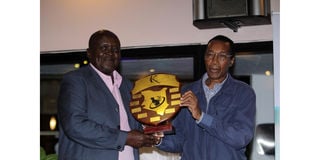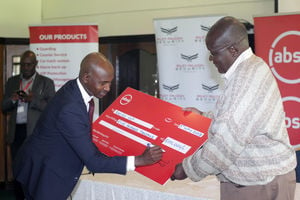
Elisha Kasuku (left) hands over the Kasuku Cup shield to Gerald Githinji on May 7, 2023 at Muthaiga Golf Club on May 6, 2023.
Veteran Kenyan golfer, Elisha Kasuku, who started his golfing career as a caddie at the Nakuru Golf Club in 1959, initially fancied a career in boxing.
Born in Nakuru on February 27, 1950, Kasuku attended DEB Baharini Primary School and later Menengai High School from 1966 to 1969.
Having been impressed by some of Kenya’s finest boxers such as such as Philip Waruinge, John Nderu, Kamau Mbugua, Isaiah Ikoni, Stingo Odhiambo, Koni Waruinge, and George Findo who launched their boxing careers at the Nakuru Amateur Boxing Club (popularly known as Madison Square Garden), Kasuku developed a burning ambition to be a boxer in the early 60s.
But after being knocked down in his very first attempt by a sparring partner at ‘Madison Square Garden’ and coming out worse off, Kasuku, then in his 20s, realised that boxing was not his cup of tea, and quickly abandoned the sport for a totally different one. He traded the confines of the boxing ring for the athletics track.
So in 1966, Kasuku made his first attempt at competing in athletics.
“I started with a road race at Menengai, running from Lake Nakuru to the Nakuru Golf Club, and I realised that I had the endurance to run, so I registered for a half marathon race at Menengai High School where I was learning. However, a teacher at the school told me to try race walk,” he said at Royal Golf Club in Nairobi on the sidelines of Elisha Kasuku Cup, a tournament held in his honour as a pioneer golfer and coach.
The tournament attracted 241 golfers, and was won by Bachoo Shaffi.
In his first race, Kasuku embarked on a 20km walk from Nakuru to Njoro and back in 1966. A year later, he won his first 20km race walk as a student at Menengai High School in a school competition, followed by ‘50km COGS Walk Race’ held between Nairobi City Hall and Athi River in Machakos County.
In 1970, he won a 20km race walk, covering the distance from Nairobi City Hall to Embakasi and back, in a national record time. He had effectively announced himself to Kenya’s national team selectors.
“In 1972, I was entered for the Olympic trials in race walk. I didn’t make the time, but I made the Kenyan team for the 1974 Commonwealth Games in Christchurch, New Zealand. Those games opened many doors for me,’’ Kasuku, who in 1975 spend six months of training in England, remembers.

Elisha Kasuku with the late president Mwai Kibaki at Royal Nairobi Golf Club during a past event.
In 1976, Kasuku was in the form of his life. He qualified for the 1976 Olympic Games scheduled for Montreal, Canada, where he was to participate in the 20km race walk. A rude shock awaited him.
Moments before the race could start, Kasuku was removed from the start, just when it was announced that Kenya had boycotted the 1976 Olympic Games.
Twenty-nine countries, among them Kenya, boycotted the Games due to the refusal of the International Olympic Committee to ban New Zealand, after the New Zealand national rugby union team had toured apartheid South Africa earlier in 1976.
In 1978, Kasuku participated in the World Walking Championship in Bergen, Norway, finishing seventh. Days later while still in Norway after the championship, Kasuku witnessed legendary runner, the late Henry Rono, break the last of his four world records that year at the Bislet Stadium in Oslo.
In a span of only 81 days, Rono broke four world records: 10,000m (27 minutes and 22.5 seconds), the 5000m (13:08.4), the 3000m steeplechase (8:05.4), and the 3,000m (7:32.1).
It was on June 27, 1978 that Kasuku watched as Rono produced a negative split to win the 3,000m race in world record time of 7:32.1 at the Bislett Games in Oslo, finishing 3.1 seconds inside Briton Brendan Foster’s old mark.
At the 1978 All Africa Games (now renamed African Games) held in Algiers, Kasuku finished third in 20km race walk. His team mates included Rashid Chege and David Munyao.
However, upon returning home after participating in the 1982 Commonwealth Games in Brisbane, Australia, Kenya’s golf legend, the late John Mucheru, and James Ngige who is now a senior pro golfer at Limuru, advised him to return to golf in 1984.
“I agreed to join Limuru Country Club briefly, and I was given handicap 10. I represented Limuru in the (prestigious 99-year-old amateur golf ) Tannahill Shield tournament at Royal Nairobi Golf Club. At the end of the year, I also participated in the Nyali Open golf tournament, finishing third. It that point, another golf legend, the late Lawrence Nginyo Kariuki, advised me to turn professional, which I did, and joined Royal Nairobi Golf Club where I have been a member since then,’’ added Kasuku. Tannahill Shield was started in 1924.
But in 1985, Kasuku got a scholarship to study Marine Setellite Engineering in Rome. While in Italy, he competed in ‘Setellite pro Golf Tour’ which later became the prestigious Challenge Tour Series.
“For the four years I was in Rome, I played in the Setellite Tour, travelled back home many times to compete in some of the competitions in the Africa Safari Circuit in Nigeria, Cote d’Ivoire, Zambia, and also the Kenya Open Championship. I returned home in 1987 and officiated in race walk competition at the All Africa Games, but I returned to Rome soon after,’’ Kasuku said.
He would return home in 1989, and form the Professional Golfers of Kenya (PGK) along with other pros in 1991 after a disagreement with the late Lawrence Nginyo Kariuki who was chairman of Professional Golf Association of Kenya (PGA) at the time.
“Through PGK, we sent Kenyan pros to play in tournaments in Nigeria, Zambia and Zimbabwe. At home here, we also set up the Smirnoff Order of Merit pro golf tournament’’.
His golf career got a major lift when he qualified to play in the British Seniors Open at Royal Aberdeen Golf Club in Scotland in 2005.
“I felt so great playing alongside some of the world’s senior professionals,’’ kasuku, who was also instrumental in starting the KCB Pro-Am Tour which is held in Kenya, Uganda, Tanzania and Rwanda, said. The tour helped improve the standards of pro golf in East Africa.
“There is need to improve the local Safari Tour by putting in more money to attract players from the rest of Africa. This will help local pros improve their game.” He regrets that many local young players are left hanging without knowing whether to turn professional or remain in the amateur ranks, because they see no future as professionals.
He wants the Junior Golf Foundation, which was founded by the Kenya Golf Union in 1995, to focus more on talented children from underprivileged families.
Kasuku married Judith Akinyi in 1982, and they were blessed with three grown-up children; son Jesse Owens Kasuku, who is named after American track and field legend Jesse Owens, and daughters Linett Akoth Kasuku and Joy Anne Kasuku.
He has produced many golfers at both Royal Nairobi Golf Club, and at Muthaiga Golf Club where he worked as resident professional. Of his children, only Joy attempted golf but gave up soon after.
He set up Kasuku Foundation to help develop golf, particularly among the underprivileged. He also plans to help revive local boxing, which is on its deathbed.
He believes Kenya has great potential to develop talent capable of doing well in international tournaments such as the Magical Kenya Open, and the Sunshine Tour in South Africa.
“This will only be possible with a proper coordinated effort and programme. When we started the Golf Talent Foundation with other golf personalities such as the late Abdalla Bekah, Charles Farrar and others, a number of golfers emerged in the caddie ranks, and some are now leading professionals in the country. Unfortunately, the Kenya Golf Union let the GTF die,” he observes.
He adds: “I like supporting these caddies and juniors because it’s my passion. I came through the caddie ranks. It’s sad that Kenyan pros fail to make cut in the Magical Kenya Open,” he says.
The Golf Talent Foundation is the brainchild of veteran golfers Kasuku, Abdalla Bekah, Charles Farrar, among others, to promote the sport among caddie golfers. Before being discontinued by the Kenya Golf Union in 2019, it was responsible for producing top local golfers, among them Kopan Timbe, James Lorum, Paul Thuo, Nelson Mudanyi, the late Peter Njiru, Kumal Dhall, Ali Kimani, Greg Snow, and Nicholas Rokoine.
Farrar, who died in Nairobi on June 2017 at 64, was the coach of Kenya’s national golf team from 2007 to 2013, was instrumental in developing all aspects of golf in Kenya, including improvement in the standard of, and maintenance of Kenyan golf courses.
Bekah, who died in 2014, is former chairman of Harambee Stars Management Board, and was once the treasurer of 21-time Kenyan champions Gor Mahia. Bekah chaired the Kenya Golf Union, assisting many caddies to join clubs as honorary members.
For his many achievements in athletics and golf, Kasuku was honoured with the Order of the Burning Spear (OBS) by President Jomo Kenyatta in 1978.
He was also honoured with the Head of State Commendation (HSC) by President Mwai Kibaki. He has coached a majority of the current crop of Kenyan professional golfers, and amateurs.
He has influenced many to take up golf as adults, including members of the now popular “Jobese” golf group, who honoured him by starting Kasuku Cup tournament four years ago.
Kasuku, who returned to Royal in 2013 after spending six years at Muthaiga Golf Club as the resident professional, says that although he started his golfing career at Nakuru Golf Club, Royal has become his golfing home.







